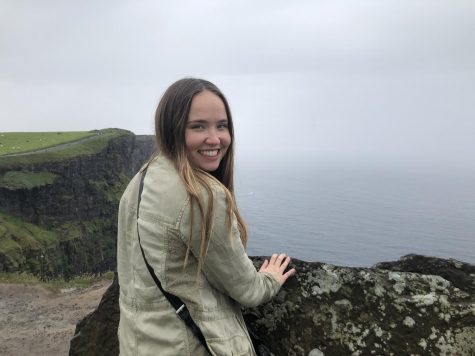Our love/hate relationship with ‘fake news’
Jan 29, 2018
From President Donald Trump to Pope Francis, the phrase “fake news” has been used quite a bit recently. Our society is constantly exposed to and engulfed in tabloids and the latest celebrity news. From Facebook to Instagram, there is no shortage of entertainment.
This overwhelming production of entertainment news has been coined as the “fake news” era. However, while all of this is just catching up on us, fake news is nothing new. In fact, this very idea was brought to light in the book “The Image, a Guide to Pseudo-Events in America,” published by historian Daniel Boorstin in 1962. While Boorstin goes into great detail about fake media and its repercussions on society, it’s clear that the issue has only gotten worse. The popularity of online news articles, celebrity culture and “clickbait” has corrupted our society, and the problem is that we are the ones who fuel it.
Our thirst for novel, entertaining news is explained by Boorstin in terms of our “extravagant expectations.” He said, “When we pick up our newspaper at breakfast, we expect—we even demand—that it bring us momentous events since the night before. We turn on the car radio as we drive to work and expect ‘news’ to have occurred since the morning newspaper went to press.”
In many ways, this encompasses our current lifestyle: We seek immediate gratification and hope to constantly be amazed and satisfied by glorified news stories. Of course, in our modern society, the media forums have changed; one could reword Boorstin by exchanging newspapers and radios for television and social media. Either way, we have high expectations, and the journalism industry needs to satisfy them in order to stay alive. Due to this, Boorstin says, “pseudo-events” occur.
Boorstin used the term “pseudo-event” to describe a fabricated news story manufactured to spawn publicity and satisfy the public’s expectations. He said these events occur in order to fill papers. Examples today would be entertainment articles about celebrities. In recent months, a considerable amount of articles have come out about Kylie Jenner’s alleged pregnancy, and each article is meant to make people believe that something new and interesting has occurred.
In many ways, celebrities are actual, living pseudo-events. We glorify them and keep up with their lives for no reason other than the fact that we find them entertaining. News is no longer news because it is important, but because we make it so. This goes right back to Boorstin’s point: Interest now trumps importance. What does this mean? It means that we now read things for entertainment instead of knowledge.
I believe that Boorstin’s idea of pseudo-events is more relevant than ever. When I go onto Facebook, I constantly scroll through countless numbers of celebrity gossip articles. When I go onto Instagram, I see pictures “exposing celebrity secrets” and the newest celebrity couples. Honestly, it’s almost sickening. We all know that what we are viewing isn’t important, yet we can’t help but be captivated. We hate fake news, yet we devour it.
So yes, Francis and Trump are correct: There is a lot of fake news out there. But we have been aware of this for quite some time, and its popularity has only grown. As we witness, watch and read fake news stories, we are simultaneously cultivating it. So here, I challenge you. I challenge you to become aware of the pseudo-events that control your life. I challenge you to avoid clickbait, to scroll past entertainment news stories and to disconnect from celebrity culture.
Boorstin said that “this change in our attitudes toward ‘news’ is not merely a basic fact about the history of American Newspapers. It is a symptom of a revolutionary change in our attitude toward what happens in the world.” If our attitudes can change once, I have hope they can change once again and reverse the fake-news era.


























